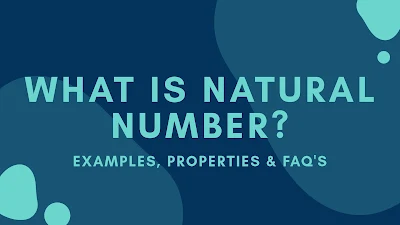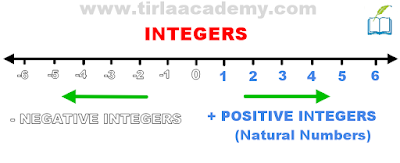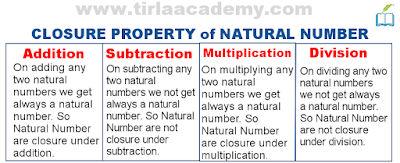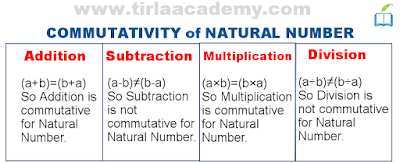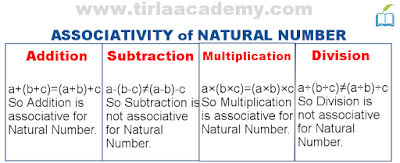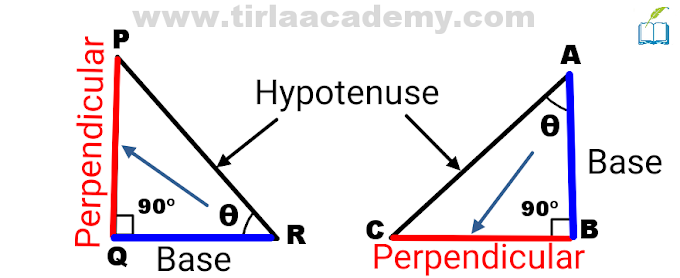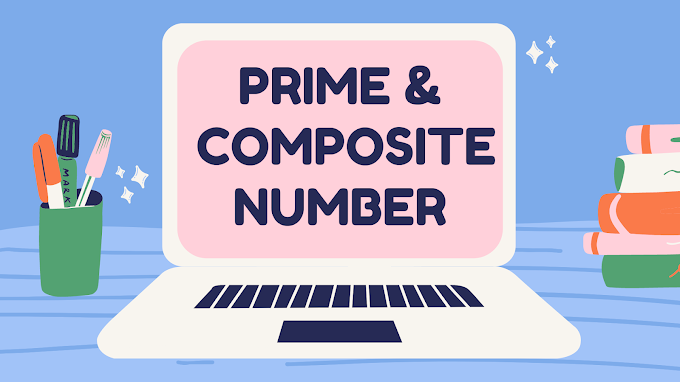Hello readers, In mathematics, we study various numbers like even numbers, odd numbers, prime and composite numbers, natural numbers, etc.
In this article, we are going to learn about natural numbers in detail. The following topics we will cover on it.
1. What is a Natural Number?2. Examples of Natural Numbers3. Properties of Natural Numbers4. Closure property of natural number5. Commutative property of natural number6. Associative property of natural number7. Distributive property of natural number8. FAQs of Natural number
So, Let's start with the definition of a Natural Number.
1. What is a Natural Number in Maths?
A natural number is a counting number starting from one. The symbol of a natural number is N.
or
All positive integers except zero is known as natural number.
We have many natural numbers that we are used in our daily life such as 1,2,3,4,5,6,7,........infinite.
2. Examples of Natural Numbers
Examples of the first 50 Natural Numbers are:-
1, 2, 3, 4, 5, 6, 7, 8, 9, 10, 11, 12, 13, 14, 15, 16, 17, 18, 19, 20, 21, 22, 23, 24, 25, 26, 27, 28, 29, 30, 31, 32, 33, 34, 35, 36, 37, 38, 39, 40, 41, 42, 43, 44, 45, 46, 47, 48, 49, 50.
Examples of the first 50 Even Natural Numbers are:-
2, 4, 6, 8, 10, 12, 14, 16, 18, 20, 22, 24, 26, 28, 30, 32, 34, 36, 38, 40, 42, 44, 46, 48, 50, 52, 54, 56, 58, 60, 62, 64, 66, 68, 70, 72, 74, 76, 78, 80, 82, 84, 86, 88, 90, 92, 94, 96, 98, 100.
Examples of the first 50 Odd Natural Numbers are:-
1, 3, 5, 7, 9, 11, 13, 15, 17, 19, 21, 23, 25, 27, 29, 31, 33, 35, 37, 39, 41, 43, 45, 47, 49, 51, 53, 55, 57, 59, 61, 63, 65, 67, 69, 71, 73, 75, 77, 79, 81, 83, 85, 87, 89, 91, 93, 95, 97, 99.
3. Properties of Natural Number
There are various properties of natural numbers that we use to solve maths problems.
1.) Closure Property
2.) Commutative Property
3.) Associative Property
4.) Distributive Property
4. Closure property of Natural number
In the closure property of natural numbers when we add or multiply two natural numbers we get a natural number.
Example:- 21+45= 66 & 19+30= 49. It means the natural number is closure under addition.
Example:- 2x4= 8 & 9x8= 72. It means the natural number is closure under multiplication.
Details of closure properties for addition, subtraction, division & multiplication of natural numbers are given in table-
5. Commutative property of Natural number
In the commutative property of natural numbers when we add or multiply two natural numbers.
Then its result will be equal to the sum or multiplication of the interchange of numbers.
Example:- (25+21)=46=(21+25). It means the natural number is commutative under addition.
Example:- (5x2)=10=(2x5). It means the natural number is commutative under multiplication.
6. Associative property of Natural number
According to the associative property of natural numbers when we add or multiply any three(or more) natural numbers.
Then the answer is equal to the sum or multiplication of the same numbers in any order.
Example:- {21+(21+13)}=55={(21+21)+13}. It means the natural number is associative under addition.
Example:- {5x(8x1)}=40={(5x8)x1}. It means the natural number is associative under multiplication.
7. Distributive property of Natural number
As per the distributive property, we distribute or take common the natural number in the bracket. As given below-
Example:- 21×(12+11) here we will distribute(multiply) a natural number 21 in 12 & 11 as (21×12) + (21×11).
Example:- (81×19) + (81×11) here we will take common(take outside) a natural number 81 as 81(19+11).
8. Natural Number FAQs
How many natural numbers are in mathematics?
There are countless(infinite) natural numbers in mathematics.
Are all natural numbers integers?
Yes, all-natural numbers are also positive integers.
What is the difference between natural numbers & the whole number?
Natural numbers are positive integers except zero. While whole numbers are positive integers & zero also.
How to use the properties of natural numbers?
To use the properties of natural numbers we take examples-
1. Example-
=12(37+44)
=(12×37) + (12×44) {using distributive property}
=444 + 528
=972.
2. Example-
=38+77+72+33
=(38+72)+(77+33) {using commutative property}
=110 + 110
=220.
Is any way to identify natural numbers?
Yes, it should be a positive integer from 1,2,3,4.......infinite.
Is 1 a natural number?
Yes, 1 is a natural number.
Is a negative number a natural number?
No, negative numbers are not natural numbers.
Natural numbers examples
Examples of natural numbers are 1, 2, 3, 4, 5, 6, 7,.......infinite.
Is 0 a natural number?
No, 0 is a whole number.
Is -6.75 a natural number?
No, -6.75 is not a natural number because natural numbers are not negative in nature.
Is 1/2 a natural number?
No, natural numbers are not in decimal form or in fractional form.
Is 88 a natural number?
Yes, 88 is a natural number. Because it is positive.
Is -18 a natural number?
No, -18 is not a natural number because natural numbers are not negative in nature.
Is 2/3 a natural number?
No, natural numbers are not in decimal form or in fractional form.
Is -2.5 a natural number?
No, -2.5 is not a natural number because natural numbers are not negative in nature.
Is -36 a natural number?
No, natural numbers are not negative in nature so -36 is not a natural number.
Is -4.7 a natural number?
No, -4.7 is not a natural number because natural numbers are not negative in nature and not in decimal form.
Is 1 a natural number?
Yes, 1 is a natural number because natural numbers start from 1.
Is -15 a natural number?
No, -15 is not a natural number because natural numbers are not negative in nature.
What is the smallest natural number?
1 is the smallest natural number.
Is -11 a natural number?
No, -11 is not a natural number because natural numbers are not negative in nature.
Is -20 a natural number?
No, natural numbers are not negative in nature.
Is -8 a natural number?
No, -8 is not a natural number because all natural numbers are positive in nature.

